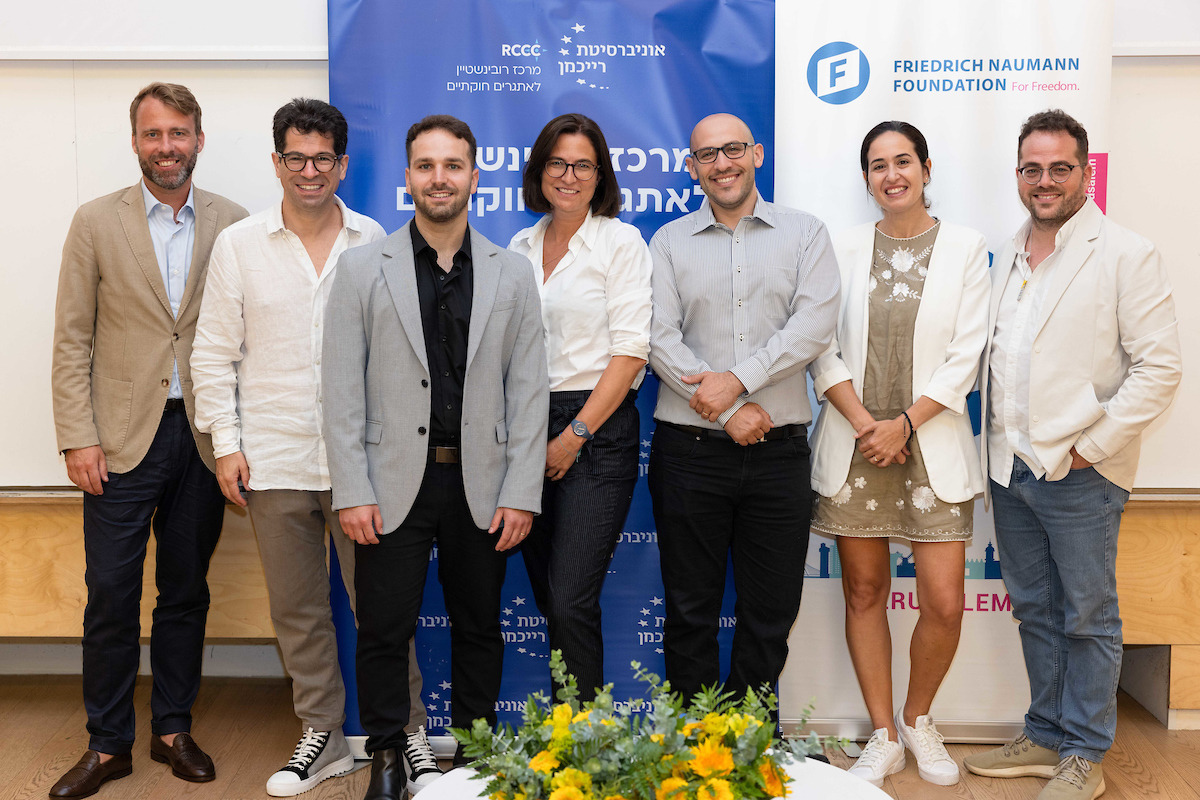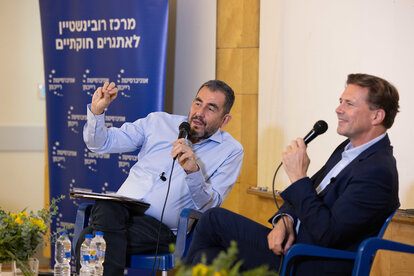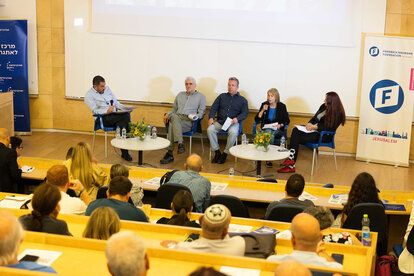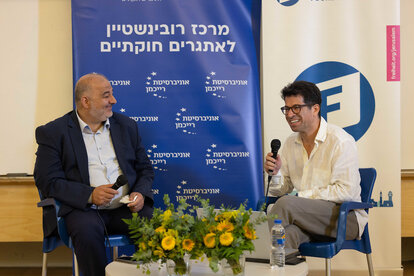Never Again
Never Again: How do Collective Traumas form Constitutional and International Order?

The Imperative of “Never Again” established a new international order and constitutional standards after the Second World War and the unprecedented genocide of the Jews in Europe.
How have these traumatic experiences affected victims and perpetrators, their following generations, their perceptions of right and wrong? How are traumas of the past reflected in constitutional frameworks, our national narratives and identities and what role do they play in handling and coping with new conflicts?
These were questions at the core of a Symposium the Jerusalem Office of the Friedrich Naumann Foundation conducted in cooperation with its partner The Rubinstein Center for Constitutional Challenges at the beginning of May.
The symposium was conducted at Reichman University in Herzliya and attracted over 100 participants and engaged prestigious Israeli experts, scholars and practitioners and the general public in an in depth reflection on a.m. questions.
The Symposium existed of two parts, the first was devoted to the effects of the constitutional design on Germany and the Jewish state of Israel by the Holocaust. The second part of the event examined the effects of the 07/10 Massacre on the Israeli-Palestinian conflict, elucidating its role as a contemporary historical trauma influencing constitutional agendas and international dynamics in the region.

The Imperative of Never Again and the German Grundgesetz
Keynote speaker of the symposium was German Ambassador to Israel, Steffen Seibert. He referred to the evolution of Germany’s constitution, the Grundgesetz (Basic Laws) after the Second World War, which was directly influenced by the imperative of Never Again. The first sentence of the first article gives proof to that internalization: Human dignity shall be inviolable. To respect and protect it shall be the duty of all state authority. As well as the so called “eternity clause” in Article 79 paragraph (3) of the Basic Law for the Federal Republic of Germany is directly drawn from the historical experience in the context of Hitler’s gain of power in Germany. Hence, the eternity clause safeguards the fundamental principles of Germany's democracy, which can never be removed, even if there is a 100 % majority in parliament to do so.
While constitutional frameworks are essential to prevent inhuman and undemocratic forces to take over power, even more important - according to Seibert - are knowledgeable and determined citizens with a strong democratic conviction, willing to defend their democratic system and values in time of crises. The lack of German citizens with a democratic conviction in the past was the decisive factor for Hitler’s power gain, less though an intrinsic defect in the constitutional system of the Weimar Republic.
To educate and encourage Germans to become the backbone and safeguard of Germany’s new democracy was also the task of the German political foundations, which mostly were established after the second world war and of which the Friedrich Naumann Foundation for Freedom is one of them.
The appeal of Never Again in Germany is hence seen as a moral duty, a call from the past to never betray the democratic system and conviction again and to sanctify human dignity before everything else. Never Again in Germany and Europe after the war also translated into the moral obligation of never to engage again in war fare and violence for power gain.

“Never Again” in Israel - Statehood and Victimhood
In the frame of a panel discussion, leading Israeli scholars Prof. Hana Yablonka, Prof. Gilad Hirschberger, Dr. Dina Silber and Prof. Alon Harel, discussed how the Holocaust is remembered in Israel and what role it plays in nation building and in the coping with existing threats.
The leading Holocaust historian, Hanna Yablonka, stressed that the Shoa survivors themselves, who escaped or survived Europe’s Nazi death camps saw in the establishment of the State of Israel the assurance that what happened to them will not be able to happen in the future. For them it was an anchor which gave them confidence and strength and also a meaning. They gained strength from this nation rebuilding and concentrated to create a new and better future for themselves and the following generation. According Yablonka, this future oriented attitude of the survivors however later on changed with the Eichmann process in the 60s pushing the Shoa to the front of Israelis’ collective memory and identity. While for the survivors the state symbolized the future and hope, for the following generation the perception narrowed to the fact that the Shoa was proof of Jewish and Israeli victimhood and also the incentive to make use of military force in order to prevent further victimhood. Yablonka advocated to follow the survivors’ proactive relation to the state, to concentrate on building the future and not on clinging to the past but rather understanding the past as a call for action and responsibility to preserve humanistic principles.
Memory is Always a Reconstruction of the Past
The psychologist, Prof Gilad Hirschberger, raised the question what we actually mean when talking about collective trauma. What does it mean a collective memory, how can it be a memory when most of the people have not been present when events actually happened? Hirschberger explained that a collective memory works the same as an individual memory, meaning that the memory is not a reproduction but a reconstruction of events. Also individuals but also the public never remembers historical events as they were since these events impact them in their presence, are motor for motivations. Therefore, it makes sense that the Israeli public makes use of the Shoa to justify the existence of the Israeli state as it serves its needs in the presence. According to Hirschberger, Israeli society is in constant tension between victimhood and stagnation and on the other hand creativity and growth.
Different Constitutional Traditions
The jurist, Prof. Alon Harel, raised the question about where do constitution draw their legitimation from and referred to two different traditions. In the case of the constitution of the United States the constitution is understood as a contract between citizens and the State, which was created in a decisive moment in history, which ties the nation together. Totally different was the approach of the authors of the constitution drafted after the Second World War in Germany. What the Germans had in mind after the Shoa was not a constitution which represents them, but a constitution which is good for them, whose justice and ideals will morally guide and emancipate them and to which THEY have to adjust themselves to. This also explains why there was no referendum in Germany about the constitution. It was an approach of reason and not of reaching a consensus. The composers of the German Grundgesetz were entirely guided by the notion of “Never Again” as to not repeat mistakes of the past.

“Never Again” in the Israeli-Palestinian Context
For Member of Knesset, Mansour Abbas, the legacy of “Never Again” in the context of the Naqba, Shoa and nation building, is an appeal to understand what is right and wrong and how we can prevent the next tragedy from happening. Most important is that neither Palestinians nor Israelis should make use of the trauma of their past as a cart blanche to do whatever they like. Leadership on both sides needs to take responsibility, learn from the past, but concentrate on the future, create hope and find creative ways out of the conflict. If Israelis and Palestinian want to live in peace and tolerance, they need a vision to reach this aim and they need to compromise and the will for reconciliation. According to Abbas, Palestinians within Israel have demonstrated astonishing civil obligation after October 7th, clearly rejecting the violence perpetrated by Hamas, but also feeling the pain of civilian Palestinians in Gaza. Israelis should acknowledge their solidarity but also their pain and dilemma. On the other side Abbas encourages Palestinians to part from their victimhood image and take over responsibility for creating a better future. It needs both sides to be determined if one aspires a change in reality.
Member of Knesset, Zeev Elkin, referred to Israel’s biggest challenge as he sees it, of being a fragmented society with many dividing lines, ethnic, religious, social groups with different world views and aspirations. Whether the State of Israel will continue to exist will depend heavily on its capability to find common ground between the different groups with their different truths and narratives. This requires compromises from all involved but also determining where the red lines are.
Arie Shavit, TV journalist and moderator of the panel, concluded the discussion by appealing to everyone to be aware about what impact the Shoa had on our perception of the reality, at the same time Israelis should understand the tragic background of their conflict with the Palestinians, but also should never give up on hope, that a better future is possible.
The organizers are planning a follow up event in mid-June with the participation of scholars, practitioners and activists from Europe, GB and USA to discuss how the rising tide of Antisemitism can be countered and how politics, civil society and legal practitioners can cooperate more efficiently in order to make sure that “Never Again” is not now.
